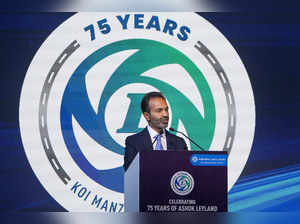Payment security mechanism, subsidies to help in growth of electric mobility: Dheeraj Hinduja

Payment security mechanism, subsidies to help in growth of electric mobility: Dheeraj Hinduja
Ashok Leyland Chairman, Dheeraj Hinduja, has highlighted the importance of establishing a well-defined payment security mechanism for long-term contracts to support the large-scale rollout of electric buses in India. In an interview with PTI, he also emphasized the significance of subsidies in accelerating the adoption of electric mobility in the country.
Hinduja outlined two key areas that could facilitate the growth of electric vehicles (EVs) in India:
1. Subsidies and Government Benefits: Hinduja stressed the importance of government subsidies and incentives as a means of promoting electric vehicles. These subsidies can make EVs more affordable for consumers and encourage their adoption.

2. Payment Security Mechanisms: Hinduja also pointed out the necessity for payment security mechanisms, particularly in long-term contracts. Such mechanisms would provide assurance to the industry, investors, and stakeholders involved in the electric bus sector. They would help ensure that financial commitments and agreements are honored, thus fostering trust and stability in the market.
Hinduja’s comments suggest that a combination of financial incentives and payment security measures is crucial for the growth of electric mobility in India. These measures can help create a favorable environment for both businesses and consumers to transition to electric vehicles, ultimately contributing to the country’s efforts to reduce emissions and promote sustainable transportation.
In the context of Gross Cost Contracting (GCC) contracts that span 10-12 years, Dheeraj Hinduja, Chairman of Ashok Leyland, emphasized the need for a payment security mechanism to provide assurance that payments will be made consistently throughout this extended duration. He noted that original equipment manufacturers (OEMs), in this case, electric bus manufacturers, require some form of security to ensure the uninterrupted flow of payments over the contract’s long term.
A payment security mechanism typically revolves around the creation of a dedicated payment security fund, designed to step in and provide interest-free capital in case of payment defaults. In the context of electric buses, the responsibility for guaranteeing punctual payments to service providers primarily falls upon state transport undertakings (STUs).
However, it’s worth noting that many STUs encounter financial difficulties and constraints, which have prompted electric bus manufacturers to advocate for the establishment of a dedicated security fund to address these challenges.
This proposed concept of a payment security fund bears a resemblance to existing arrangements within the power sector. In the power sector, similar mechanisms are already in place to ensure that payments to power suppliers and other stakeholders are reliably executed. These mechanisms have proven to be effective in providing financial security and stability, which in turn fosters confidence among investors, service providers, and industry stakeholders.
By extending a similar model to the electric bus sector, governments and relevant authorities can help mitigate financial risks, instill trust, and provide assurance to electric bus manufacturers and service providers. This, in turn, can facilitate the growth and expansion of electric bus fleets, further promoting sustainable and eco-friendly public transportation options.
Hinduja acknowledged that, overall, the government has been making significant efforts to support cleaner fuels and address pollution concerns within cities. However, the establishment of a payment security mechanism in the electric bus sector could further facilitate the transition to cleaner and more sustainable transportation options, providing stability and confidence to both manufacturers and service providers.
Dheeraj Hinduja, Chairman of Ashok Leyland, acknowledged that the government has provided subsidies to encourage the production of electric vehicles (EVs). He noted that many private customers who are committed to achieving net-zero emissions are purchasing EVs independently, regardless of subsidies.
However, in the case of buses and light commercial vehicles, the demand is more dependent on government support through subsidies. Hinduja emphasized that wherever there is government support in terms of incentives, there is a clear increase in demand for electric buses and light commercial vehicles.
He also highlighted that while a significant increase in electric vehicle adoption across all segments may take some time, the trend is moving in the right direction, especially for major city requirements such as buses and light vehicles.
Dheeraj Hinduja’s acknowledgment of a coexistence period between electric and alternative fuels alongside traditional diesel vehicles reflects the ongoing transition within the transportation industry, marked by a gradual shift toward cleaner and more sustainable mobility solutions. As one of India’s foremost commercial vehicle manufacturers, Ashok Leyland plays a pivotal role in shaping the future of transportation in the country.
The company’s active involvement encompasses various aspects, from the development of electric vehicles (EVs) tailored to Indian conditions to the establishment of essential charging infrastructure. Collaborations, partnerships, and engagement with government agencies and policymakers further underscore Ashok Leyland’s commitment to promoting EV adoption and sustainable transportation solutions.
Through these efforts, the company contributes significantly to advancing a cleaner and more environmentally friendly future for mobility in India, aligning with global efforts to reduce emissions and address climate change while meeting the evolving needs of the country’s transportation sector.




